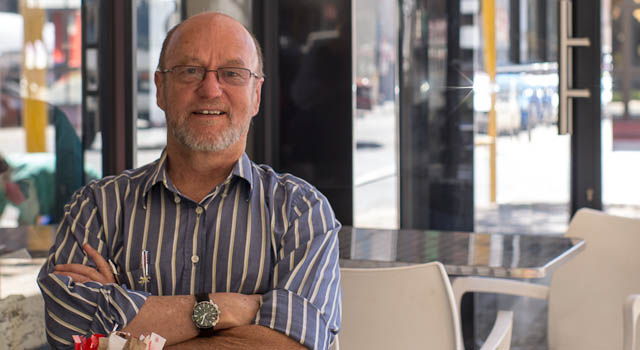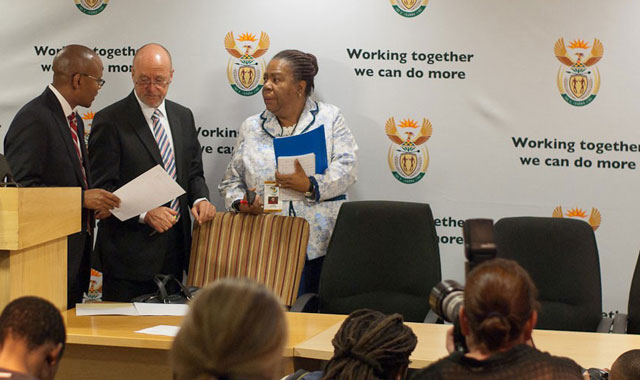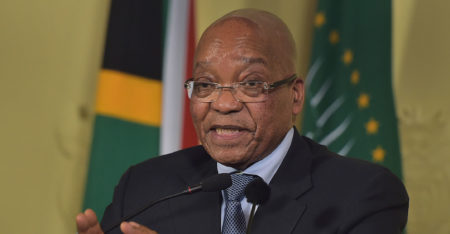
With hair clipped close to his head and a speedy gait, Derek Hanekom, 59, is energetic but welcoming when he sits down with me at a roadside restaurant table on Anderson Street in downtown Johannesburg.
He puts his Apple iPhone on the table, orders coffee and sparkling water, and, when I ask him for his overview of his background in government and, before that, in the liberation struggle, says: “Would you like the one-hour, two-hour or five-hour version?”
Earlier this month, President Jacob Zuma announced that Hanekom, previously deputy minister of science & technology, would replace Naledi Pandor as minister.
Born and schooled in Cape Town, Hanekom had an English-speaking mom and an Afrikaans-speaking dad. He had no problem slotting into an Afrikaans high school.
Like many of his white peers, Hanekom followed school with compulsory military service — before registering for a law degree at the University of Stellenbosch. But barely midway through his first year of study, he began having doubts about his decision and opted to spend six months travelling before returning to university. “Six months turned into two-and-a-half years,” says Hanekom.
“Travelling gripped me. I did all sorts of different jobs and it was great getting exposure to so many different places and people. I came back [to SA] with little desire to study.”
The future cabinet minister wound up in Johannesburg and spent two years working at Santarama Miniland, a peculiar theme park south of the city with scale models of famous SA buildings and landmarks, where he operated a ferry on the nearby Wemmer Pan, worked in the shop and acted as a general handyman.
Uprising
Hanekom admits that before 1976 and the Soweto uprising, where schoolchildren took the streets to object to being taught in Afrikaans — the language of the oppressor — he had little interest in the political situation in SA.
The uprising made it difficult not to become at least somewhat politically conscious, he says. “I had a lot of friends on the left, if you like. But social interaction between whites and blacks was still limited and white activism tended to play out in student or church organisations.”
It was just before Christmas in 1977 when things changed dramatically. One of Hanekom’s closest friends was detained at Johannesburg’s notorious John Vorster Square. Hanekom and his partner Trish — who later became his wife — and a number of their friends decided to mobilise church groups and other interested parties to stage a peaceful protest singing Christmas carols outside the notorious apartheid-era police station where torture and abuse was common. “Forty-four of us were arrested and spent the night in jail.”
This became a turning point in Hanekom’s politicisation. Because he was seen as a ringleader, he was pulled out of the holding cell in which he was being detained and was assaulted.
“I realised that the stuff that you read about — ‘accidental’ deaths in jail and the myth of slipping on a bar of soap — was all false,” he says. He realised the police could act with impunity because they’d had no fear about assaulting him in front of witnesses. It wasn’t to be long before he joined the then-banned ANC.
The following year, in 1978, Hanekom, his future wife and some friends began farming in Kuils River in the Western Cape. “I was 25 and Trish was even younger. We were idealistic with no money. I’d spent some time on a kibbutz while travelling and that’s how we ran the farm. There was a group of us, all politically involved people, and we pooled our money and tried to make a go of it.”
After a year, the couple decided to go it alone and rented a farm near the town of Magaliesburg, northwest of Johannesburg. There they grew vegetables, kept chickens and built a small dairy herd. “We had maybe 12 cows at most, which we milked, and we made yoghurt and cottage cheese and hard cheeses. The original Grace Hotel, which you could see from the farm, was one of our first customers.”
During this time, they cautiously established connections with the ANC and hosted political activists and others over the following five years. “Part of our role was to discuss politics, mostly with young white activists and encourage them to find alternatives to military service: it was the early days of the ‘end conscription’ campaign.”
It was around this time that the anti-apartheid United Democratic Front coalition was established. Through political connections, Hanekom met SA Defence Force conscript Roland Hunter, who had access to sensitive information about the military and its support of the then armed Mozambican resistance movement Renamo, which enjoyed the secret backing of the apartheid government.
“Hunter knew he had a moral obligation to pass on the information,” Hanekom says. “In turn, we passed it on to the ANC.”

The ANC’s then-president, Oliver Tambo, met with Mozamibican president Samora Machel and was able to furnish information on the location of Renamo training camps and even when and where the SADF was dropping supplies for the rebels.
Says Hanekom: “The SADF knew information was flowing, and eventually they narrowed it down to Hunter and we were all arrested.”
Enemy of the state
The Hanekoms and Hunter were charged initially with high treason but the charges were later reduced when a deal was struck: the government at the time didn’t want sensitive information to become public through the courts.
“Roland got five years, Trish got three, and I got two and a bit,” Hanekom says. As Hanekom’s wife was originally from Zimbabwe — she had permanent residence in SA but not citizenship — she was deported upon her release from prison. Hanekom joined her in Zimbabwe, but his passport was stolen from his vehicle while there. SA refused to issue him with a new passport.
“I had to apply for refugee status in Zimbabwe, but eventually — through the assistance of the Ghanaian high commission — I got a Ghanaian passport, as if I’d been born there,” Hanekom says. “It was totally fraudulent, but official, and it was enough to get residential rights in Zimbabwe.”
Three years later, the ANC was unbanned and, in 1990, the couple returned to SA to work full time for the ANC. Hanekom worked on land and agricultural policy and, in 1994 — much to his surprise — was appointed as minister of agriculture & land affairs in the Mandela administration.
“I didn’t set out to become a politician,” he says. “I just wanted to be involved in the liberation struggle.”
Challenges
Today, Hanekom is science minister, after serving as deputy minister for eight years.
Hanekom says one of his biggest challenges is ensuring SA spends more on research and development. The country is struggling to reach an R&D spend target of 1% of GDP, even though eventually he believes the country should be trying to achieve a figure of 1,5% or even more.
He laments a decrease in private-sector spending on R&D. “We’ve instituted a tax incentive to encourage R&D, but the uptake hasn’t been what we had hoped,” he says. “We also need to increase public spending on R&D — even with fiscal tightening, we haven’t seen a decrease, but we need to see a marked increase.”
Another important measure of R&D is how successful it is. “We’ve done well there, I think. We’re encouraging collaboration between councils and universities and creating centres of excellence where we can attract quality researchers and people needn’t chase funds for research.”
Hanekom says SA’s information and communication technology sector faces institutional and regulatory challenges. “We need to expand the reach of broadband and make it affordable. But that’s the department of communications’ priority. The department is talking about universal access by 2020 and at a recent cabinet meeting on infrastructure we agreed that we should expedite that.”
The more immediate challenge, says Hanekom, is getting schools and clinics connected.
Twitterer
Unlike most politicians, Hanekom is an active user of modern communications technology, including social media.
“I’ve been on Twitter for about two years,” he says. “I was persuaded that it was good for interacting with the public and to make myself more accessible. I didn’t know what I was getting myself into.”
He says he likes the fact that Twitter is “instant and borderless”.
“It’s nothing short of a revolution. For me it became a source of picking up what people say very quickly and, rather than reading an article with one perspective, you get to hear lots of voices weigh in on topical issues.”
He says it’s also a great platform to “communicate to the public what the life of a politician actually entails. You get to demystify what you’re doing.”
Hanekom says that, as his follower base grows — it was approaching 10 000 at the time of writing — Twitter becomes a great medium to inform people about science and technology, which has become his passion.
“It’s a very effective way to reach lots of people, but Twitter is also dangerous for a politician and other public figures. It’s very easy to say something impulsively on Twitter.”
Hanekom is also a self-confessed Apple fan. He wasn’t an Apple user before the iPad was launched. But, he says, the tablet is “so easy to use”.
A voracious reader of fiction, he also has a Kindle, and he uses the iPad for magazines and work documents. “The ANC disciplinary committee is one part of my life and the iPad allows me to carry a lot of documents around. It’s great to be able to reference them quickly.”
In addition to their home in the suburb of Kensington, east of Johannesburg, the Hanekoms have the use of a government-owned flat in Cape Town. “The flat is wonderful,” he says, “particularly for the beach walks we like to take.”
He and his wife favour game parks for holidays. “We really like nature.” — © 2012 NewsCentral Media




